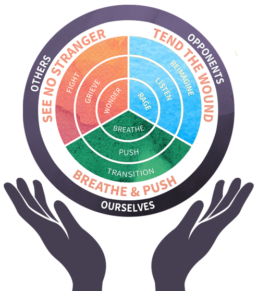9: Transition

“The final stage of birthing labor is the most dangerous stage, and the most painful….The medical term is ‘transition.’ Transition feels like dying but it is the stage that precedes the birth of new life….In all our various creative labors—making a living, raising a family, building a nation—there are moments that are so painful, we want to give up. But inside searing pain and encroaching numbness we might also find the depths of our courage, hear our deepest wisdom, and transition to the other side.”
“Transition is the most painful and dangerous stage, but it’s also where we begin to see what comes into the space we open up….In such moments, I see glimpses of a nation waiting to be born, the society we aspire to be—an America that is multiracial, multifaith, multigendered, and multicultural, a nation where power is shared and we strive to protect the wellness and dignity of every person and work to save our earth and our collective future. Each of us has a role in this long labor, no matter who is in the White House. That means when a voice in us says, ‘I can’t,’ our most urgent task is to find the wisdom to stay in the fire.”
—Valarie Kaur, See No Stranger, Chapter 9
Understanding Transition
A Practice of Love for Ourselves
Transition is both a noun and a verb. Transition is the fiery process that is required to move from one reality into another. To transition is to summon the courage to stay in the labors of love and justice, even when we want to give up. It requires us to draw upon collective wisdom to birth something new together.
- Where does your fear reside in your body? Think of a difficult moment when you heard a voice in you that said, “I can’t.” Where is that voice coming from? Rest your attention on that part of your body. Imagine that this voice has a form and shape and color. Would it be an animal, object, or landscape? What name would you give it? Let’s call it Little Critic. Notice what it feels like in your body.
- Choose to wonder about the Little Critic in you. Where did it come from? What does it need? How is it trying to protect you? What is it saying to you? Let yourself listen. Notice what you feel in your body.
- Where does your deepest wisdom reside in your body? Imagine a place inside you. Rest your attention on that part of your body. What form does your wisdom take? Let it take more shape. Let it take color. Let it take form. Let it grow more vibrant. Let it grow stronger before your eyes. Let it rise inside of you. Notice what it feels like in your body.
- Choose to wonder about the Wisdom in you. Where did it come from? How is it protecting you? What is it trying to say to you? Your deepest wisdom has been waiting for you to get quiet enough for you to hear it.
- What do you need to be brave with your life? You are in a transition; the world is in transition. How do you need to change in order to change the world? Who will help you through this transition? Get quiet and listen to that voice of deep wisdom.
- What does it mean to “transition” as a practice of revolutionary love?
- In what ways is the practice of transition an act of loving ourselves?
- What does it mean to transition our nation and our world through revolutionary love?
- How can understanding the transition stage help us to respond to the challenges of the present time?
- Create a wisdom practice. Choose ways to listen to your deepest wisdom, the parts of yourselves that are wise and brave and unfailingly loving. This might mean protecting a few minutes daily to journal, meditate, draw or color or create—whatever gives you the stillness to quiet the noise of the world and listen to the wisest voice within you. If you do not yet hear anything, that is okay. Keep breathing. Keep listening.
- Reflect back on your responses to the questions from the Reimagine lesson. Ask yourself: Who do I need to be to contribute to this new vision of the world?
- Practice in community. Ask yourself: Who do I need with me so that I can stay in the labor of transition? Who can I support so that they can transition too?
- Surround yourself with sources of bravery. Who makes you brave? These may be people in your life, or they may be ancestors, authors, artists, or activists you have never met. Keep these people and their voices close to you so that you can nourish the root of your own deepest wisdom.
- Transition requires endings as well as new beginnings. As individuals we can ask: What stories am I willing to let die in order for new possibilities to be born? As a society we can ask: What stories about our nation have to die for a new America to be born?
- Reflect in your wisdom journal. The wise voice in you will tell you what practice you need on the revolutionary love compass — when you need to breathe, push, grieve, rage, fight, and on. What do you need on any given day, in any given moment? Calling forth our deepest wisdom is not just how we love ourselves. When we lead with our deepest wisdom, not our fear, we can play our role in transitioning the world around us. Imagine a critical mass of people leading from their deepest wisdom: We can transition humanity as a whole.

